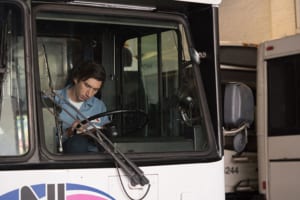First off, I’ve seen Jim Jarmusch’s Paterson twice in two days. I haven’t seen a movie twice in theaters since Denis Villenuve’s Arrival. It’s been three days since I saw Paterson last and I’m still thinking about it, talking about it, raving about it. I loved this movie. There’s just no other way to say it. Watching Paterson is like putting on a fuzzy pair of slippers. It stays with you; the characters and mood of the film act like a soothing balm for these turbulent times.
 At it’s core Paterson is a movie about a healthy well adjusted couple: Paterson (Adam Driver) and Laura (Golshifteh Farahani). If it was solely about their relationship it would still be worthy of praise. So often movies are about the disintegration of romantic relationships or worse yet use the relationship as an allegory or catalyst for something else.
At it’s core Paterson is a movie about a healthy well adjusted couple: Paterson (Adam Driver) and Laura (Golshifteh Farahani). If it was solely about their relationship it would still be worthy of praise. So often movies are about the disintegration of romantic relationships or worse yet use the relationship as an allegory or catalyst for something else.
Jarmusch has taken a different path entirely. Not only is Paterson a love story it is also about everyday people and the quiet joy of everyday life. Again, a lesser director would have framed the movie as ‘characters living lives of quiet desperation’. Jarmusch has seen that movie, as have we, and has opted instead to show us something else.
Movies can transport us, provide an escape. There is no escape in Paterson. There is merely recognition. Both the movie and the character are immersed in the present. It’s philosophical filmmaking without the pretensions. A bus driving poet could easily begin to grate our patience. But Jarmusch wisely makes Paterson humble. He doesn’t walk around boasting of his talents. He doesn’t talk like how poets usually talk in movies.
 He is, as I’ve stated before, present in the moment. Paterson is a man of few words, but he is a keen observer. There is a decency about him. Whenever he happens across a fellow poet, he is eager to listen and support them. Paterson never actually calls himself a poet but he is always ready to listen and give words of encouragement to others.
He is, as I’ve stated before, present in the moment. Paterson is a man of few words, but he is a keen observer. There is a decency about him. Whenever he happens across a fellow poet, he is eager to listen and support them. Paterson never actually calls himself a poet but he is always ready to listen and give words of encouragement to others.
When on the way home Paterson passes by a little girl sitting by herself, he pauses. He looks around and asks if she’s by herself. She tells him she’s waiting on her mother inside. Paterson asks if he can wait until her Mother comes back. What follows is a scene of perfect human and artistic connection.
Overall, it’s a movie of observation. It observes behaviors, like the way we talk. Paterson explores the commonality of language and how it connects us. To have all this in a movie essentially about a guy named Paterson who drives a bus in Paterson, New Jersey and who is an aspiring poet would be ponderous in a lesser director’s hands. But it works.

